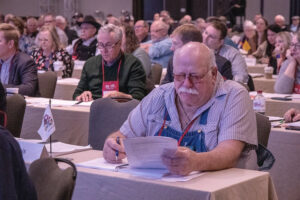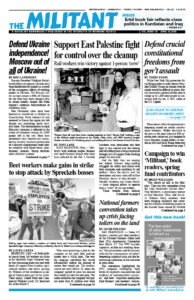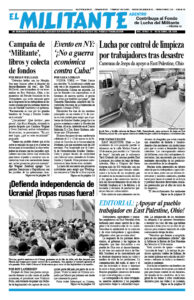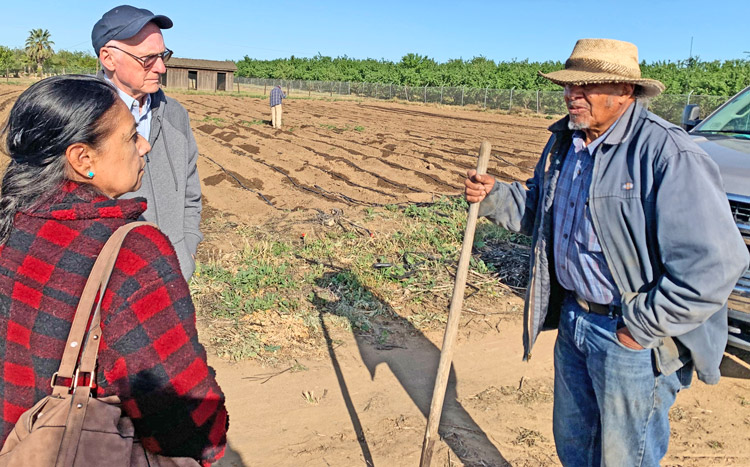SAN FRANCISCO — Some 475 farmers, ranchers and other members of the National Farmers Union held their 121st Anniversary Convention here March 5-7. The NFU includes capitalist, middle and working farmers. The presentations and discussions reflected the consequences of today’s deepening capitalist crisis and the deteriorating conditions of life and work in rural areas.
The convention highlighted the NFU campaign challenging “high levels of corporate concentration and evidence of anticompetitive practices,” and how “corporate monopolies limit farmers’ and ranchers’ choices, pay them less, and charge them more.”
The policy document pointed to a lawsuit against the four largest beef processors, which control 80% of the market, charging they agreed to set buying practices to artificially affect both cattle and beef prices to increase profits.
Secretary of Agriculture Tom Vilsack told the meeting that the last couple years have seen “record farm income” nationwide, but he had to admit that 50% of farmers had a “negative income,” and 40% made money only by adding in jobs worked off the farm or from other sources.
The perspective Vilsack and other featured speakers presented was to rely on litigation, legislation, regulations, government programs and capitalist parties and politicians, like himself.
“Only 10% made an income from farming and ranching! After so many years of supporting and relying on Democratic and Republican party politicians,” Socialist Workers Party member Joel Britton told those he talked to. The SWP participated in the convention to meet working farmers, showing people a Feb. 21 SWP National Campaign statement by Ellie García, the party’s 2022 candidate for U.S. Senate from California headlined, “Build an alliance of workers and farmers!”
“To move forward,” Britton said, “workers, working farmers and ranchers — all exploited producers — need a fighting alliance against the capitalist class, which benefits from pitting farmers against workers. Our fight is class against class. After decades of farm bills in Congress, no meaningful relief has come to those toiling on the land. Government reform measures and lawsuits in the absence of struggle divert our efforts into reliance on our class enemy.
“We need to break from the Democratic and Republican parties altogether and look toward building a labor party based on the unions that would champion the cause of working farmers and ranchers,” Britton said. “Such a party could lead a fight for a workers and farmers government.”
Farm debt has soared, reaching levels not seen since the 1980s. “It’s hard for the little guy to compete,” Dave Berger, a retired rancher from Center, North Dakota, told the Militant.
“It’s getting impossible to farm because of the cost of grazing land, electricity and gas. If you are starting out brand new you will be a few hundred thousand dollars in debt for the land, tractors, cattle, etc.”
Giant agricultural implement company John Deere won’t give farmers or independent mechanics access to information they need to fix their equipment, forcing farmers to lose time and to pay exorbitant prices for repairs.
Michigan farmer Dennis Kellogg told the Militant that he and many other farmers “have postponed purchases of new equipment to avoid the software technology that prevents farmers from working on it.”
Farming vs. solar panels
One conference session featured a panel of “nonprofit” groups hailing the expanding solar energy industry and its promises to help cut carbon emissions
“A Princeton net zero study shows we can be 100% carbon free, but it will take 10.4 million acres of farmland,” said Anna Slager from The Nature Conservancy.
“Eighty-three percent will have to be on existing farmland and 50% of that on some of the most productive farmland,” Samantha Ley, from American Farmland Trust, added. She admitted farmers are being displaced because they couldn’t pay the rent solar farm developers are demanding.
“I was offered a contract for $12 million for 35 years. In 60 years of farming that land I never made $12 million,” Kellogg said in the discussion period. “This is some of the best farmland in Michigan, 200 acres. It’s tearing my heart out. How can they pay this much to use my land?”
Another convention topic was the risk ranchers face from fires and other disasters that can ruin the land where they graze their herds. “Ranchers are improving the public lands we graze on,” said Charles Hibner, a rancher from New Mexico. “Fires are much worse when we are not grazing the land because we keep fires to isolated periodic burns that are clean and don’t get too hot.”

Many of the discussions at the convention reflected the growing crisis rural communities face. Drought conditions affect ranchers in New Mexico, who said they haven’t had water for irrigation and have to truck water in for their herds. This requires them to rely on distant grocery stores for food they could grow themselves. A delegate from Minnesota explained that it is a three-hour drive to get to a dentist from where she lives.
Others spoke about recent closures of maternity hospitals in rural areas and the need for early childhood care and education resources.
Safety of farmers and communities alongside the railroad tracks was on the mind of people here in the wake of the derailment and social disaster in East Palestine, Ohio. Many were critical of Norfolk Southern railroad.
Nebraska delegate and farmer Vern Jantzen won support for adding language to the National Farm Union policy document saying, “Any train or light engine used in connection with the movement of freight must be operated with a crew consisting of at least two individuals,” and calling for “mandatory modern safety sensors on rail car axles.”
“Good, reliable and safe rail service is in the interests of the American farmer,” Kellogg told the Militant. “I didn’t know rail workers didn’t have enough time off work,” he said, until he learned about the issues in their contract battle last year. “How can you plan ahead for illnesses and family deaths?”
“We need to fight for workers control of rail operations to guarantee safety of the workers and those who live near the tracks,” Britton told Kellogg. “And we should support the workers and farmers in Ukraine fighting to defeat the invasion by Moscow.” Kellogg was interested in Britton’s description of Bolshevik leader V.I. Lenin’s fight for the right of nations to self-determination.
National Farmers Union President Rob Larew announced that $135,000 was donated by NFU members to the World Food Program USA to help Ukrainians since Moscow’s assault began.
Immigrant rights, farmworkers
Julie Keown-Bomar, executive director of the Wisconsin Farmers Union, told Militant correspondent Carole Lesnick that her organization participated with Voces de la Frontera in a walk for immigrant rights in Wisconsin. She said that many dairy farmers are “totally dependent” on immigrant workers. “The exploitation of immigrants allows some farms to grow. It’s easy to target immigrants. I say blame the system not them.”
The capitalist class uses the immigration question to deepen divisions among the exploited producers. The Socialist Workers Party calls for amnesty for undocumented workers, support for farmworkers’ struggles against low wages and bad conditions, and backs their fights for a union. The only future for working farmers is to join forces with the working class and build a worker-farmer alliance.
Lesnick spoke to Keown-Bomar about the need for solidarity between workers and farmers. Keown-Bomar said she wrote op-ed contributions to the media in support of the strike of John Deere workers in 2021.
“We are losing two dairy farms per day in Wisconsin. There are 6,000 now and still the same number of cows, so the bigger operations are buying up the others,” she said. Lesnick showed her a letter of solidarity signed by farmers in North America sent to the National Association of Small Farmers of Cuba (ANAP) on the 63rd anniversary of the first agrarian reform of the Cuban Revolution. She explained that to this day Cuban farmers can’t lose their land as long as they farm it.
“There are different classes of farmers,” Militant worker-correspondent Jacob Perasso told Tommy Hexter, who works for the Iowa Farmers Union. I showed him a copy of New International no. 4, where Socialist Workers Party leaders put forward a program to defend the exploited farmers and farmworkers based on an alliance with the working class as a whole. Hexter said he wanted to read about that and the farming cooperatives in Cuba discussed in that issue.
There was interest among some working farmers in the politics the SWP raised and discussed, both about what exploited producers face and on the big political, social, and economic changes in the U.S. and the world.
Hexter and Keown-Bomar were among several conference participants who got copies or a subscription to the Militant, New International no. 4 and The Low Point of Labor Resistance Is Behind Us: The Socialist Workers Party Looks Forward. A few farmers and other participants exchanged information with SWP members to visit and continue discussions.


